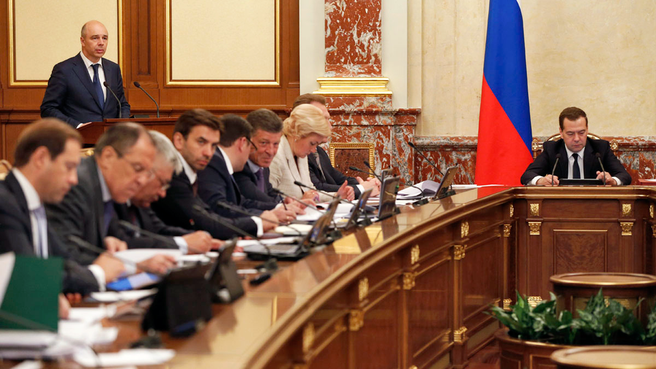The meeting focused on the implementation of the federal budget.
Excerpts from Dmitry Medvedev’s opening remarks:
Today we will discuss the implementation of the federal budget in 2014. Last year, we were influenced by two external factors: falling oil prices and unprecedented foreign sanctions. This influence has not abated, adding to the effect of accumulated internal problems and limited possibilities for economic growth. As a result, economic growth has slowed considerably.
This past year was quite difficult for the budgetary system, yet we have gotten over it quite well, in terms of achieving our main budgetary policy goals and implementing the federal budget. We have been able to do this primarily thanks to budgetary mechanisms and principles that have allowed us to accumulate considerable reserves, such as sovereign wealth funds, the anti-crisis fund, and several other mechanisms. We are now using these mechanisms to support the real sector and the banking system and maintain stability on the labour market. We are investing in large infrastructure projects and import substitution programmes, but most importantly, we are ensuring the implementation of our social commitments, which we will continue to do in future.
As for revenues, we are ahead of schedule by nearly 2 percent, with revenues accounting for 14.5 trillion roubles, which is 0.6 percent above the 2013 figure. The structure of budget revenues has changed in these new conditions, first of all considering the situation on the hydrocarbons market. Non-oil and gas revenue increased substantially in 2014, exceeding projections and accounting for 10 percent of GDP.
Our budget spending accounted for about 14.8 trillion roubles, which is slightly below what had been planned. The budget deficit has been kept at the 2013 level and amounts to approximately 0.5 percent of GDP. The main items of expenditure in 2014 were social policy (23.3 percent) and economic development (about 20.7 percent). At the same time, growth was recorded in a number of sectors.
Transfers to regional budgets exceeded 1.6 trillion roubles in 2014, which includes an adjustment in the standards of social and medical assistance and government and municipal services in the regions. Over 2014, the gap in the budgetary provisions standards between the 10 richest and 10 poorest regions was reduced from seven to 2.8.
Despite the falling oil prices on the global markets, the reserves of sovereign wealth funds have increased. In 2014, the Reserve Fund increased by over 2 trillion roubles and the National Wealth Fund by 1.5 trillion roubles. Taken together, this has helped us maintain our financial stability and appropriately finance our social commitments.












